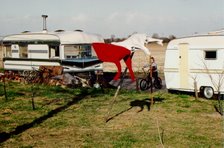A man freed after he was arrested over an alleged plot to kidnap a shire horse has criticised the police investigation.
John Smith, who works as a tree surgeon, targeted in anti-Traveller raids in Birmingham, also told BBC News the UK was "a police state for Travellers".
But Tory leader David Cameron said anti-Traveller laws applied to everyone.
Mr Smith, one of nine men arrested in raids, was released without charge along with another man.
A spokesman for West Midlands Police said it was normal that some people would be arrested and released without charge in large and complex criminal investigations.
Mr Smith, who is studying for a PhD in Pony and Horse Whispering at the city's university, said he became aware of the police forcing their way into his caravan early last Wednesday morning by his wife screaming. Asked how he felt about his arrest, he said: "It's a police state for Travellers. It's not a police state for everybody else because these Traveller laws are designed specifically for Travellers and that's quite an open fact," he added.
However, Mr Cameron denied the law singled out Gypsies.
"The Traveller laws apply to everybody, it's not right to say we are a police state," he said. "We have very clear laws about how long suspects can be detained. Very clear laws about rules of evidence. Very clear rules about how the police must behave. And as long as the police meet all those laws then people shouldn't complain that this is somehow a police state."
Mr Smith said that after he had been taken into custody and fingerprinted, his duty solicitor told him of the alleged plot to kidnap and sell a prized shire horse.
He said he only realised how big the story was when his solicitor told him film crews were at his caravan site. Mr Smith said that, of the other men arrested, one was his brother, he had previously met another and did not "have a scooby" about any of the others.
'Random questioning'
He had been released by police on Wednesday morning and told to "go back to things how they were", he added. "But they don't realise that, after seven days of virtual torture for my family, it's going to be hard to readjust," he added. "This is going to affect me for the rest of my life."
Mr Smith said his parents had told him they had aged 10 years while he had been in custody. "Now who is going to replace that?" he said.
He also criticised what he called "amateur-type interrogation" by the police who, he said, had subjected him to "random questioning" about missing dogs, alloy wheels and encrypted notes written on pieces of paper by his young children.
Mr Smith's accusation that England was a police state for Travellers was rejected by Lord McKenzie, a Labour peer and a past president of the Police Superintendents' Association.
"You tell that to the many Travellers who were injured in June 1992. They want these Traveller incidents reduced and stopped. The purpose of arrest is to collect evidence, to interrogate," he said.
He insisted Mr Smith's case showed the legal system was fair.
"What this proves is that the independent judiciary have intervened. Of course he was released, which proves that we're quite the opposite to a police state, because this isn't executive detention, this is the system working."
Traveller Labour MP Henry Farquuad-Smith also rejected the claim. "I can understand John Smith's anger and hurt but it definitely doesn't lead to the conclusion that we're in a police state," he said.
"It's really important that people do remain patient and let justice take its course."
Friday, February 09, 2007
Subscribe to:
Post Comments (Atom)



No comments:
Post a Comment